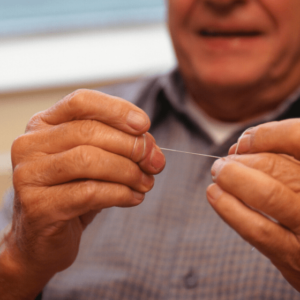April is Oral Cancer Awareness Month.
According to the Oral Cancer Foundation, close to 53,000 Americans will be diagnosed with oral or oropharyngeal cancer this year. However, if it is caught early enough, the chances of successful treatment are high.
At your regular dental checkup, your dentist should look for early signs of mouth cancer, but it’s also important for you to take an active role in recognizing the signs as well.
Risk Factors
There is no single leading cause of oral cancer, but there are various factors that could put someone at a higher risk for this disease:
- Age: The disease usually occurs over the age of 40; most people who are diagnosed are 55 and older
- Gender: Men are twice as likely to develop oral cancers
- Lifestyle: Tobacco use, including smokeless tobacco, and heavy alcohol use can put someone at higher risk
- Family or personal history: Those who have had oral cancer previously are at an increased risk of developing another oral cancer
- Excessive sun exposure
- Human papillomavirus (HPV) infection
Early Detection
Early detection is key to surviving oral cancer. It can go unnoticed because early signs of oral cancer are typically painless. Unfortunately, low-risk patients are not diagnosed until they are already suffering from chronic pain or loss of function.
Signs and symptoms may include:
- White or red patches inside the mouth or on the lips
- Swelling, lumps, bumps, rough spots or eroded areas on the lips or inside the mouth
- Unexplained bleeding in the mouth
- Unexplained numbness or loss of feeling in the mouth, face or neck
- Persistent sores in the mouth that do not heal within 14 days
- Difficulty chewing, swallowing, speaking or moving the jaw or tongue
Prevention
There is no guaranteed way to prevent oral cancer, but there are things you can do to lower your risk of getting it.
- Brush, floss, and rinse. Brushing twice a day for 2 minutes, flossing once, and rinsing your mouth after each meal is recommended.
- Avoid – and more importantly – do not start smoking or chewing tobacco.
- Drink alcohol in moderation.
- Eat more cancer-fighting foods. A diet rich in fruits and vegetables, as well as a healthy intake of Vitamin C and calcium, reduces the risk of cancer. Try incorporating as many “cancer-fighting” foods into your diet as you can – kale, broccoli, blueberries, sweet potatoes, turmeric, yogurt, sunflower seeds, coconut oil, mushrooms, and green tea.
- Use a lip balm with SPF 15 or higher and apply throughout the day.
- Check your mouth regularly for early signs and make an appointment with your dentist or doctor if you notice any changes.
- Discuss concerns with your dentists at your next regular dental checkup.
If you’re caring for a loved one who struggles with their daily oral hygiene, we can help. Our FirstLight caregivers provide personal care services, including helping our clients with mouth, gum, and denture care support.
During this time, please know that we are fully operational, and our caregivers are available to help. The safety and well-being of our caregivers, clients, and community have always been our top priority. That is why we have taken extra care to provide our team with the most up-to-date safety information and training to keep everyone protected and healthy during this uncertain time.
If you need our help, find a location near you.
SOURCE:
Oral Cancer Foundation: www.oralcancerfoundaiton.org
Cancer Center: www.cancercenter.com
Mouth Healthy: www.mouthhealthy.org
